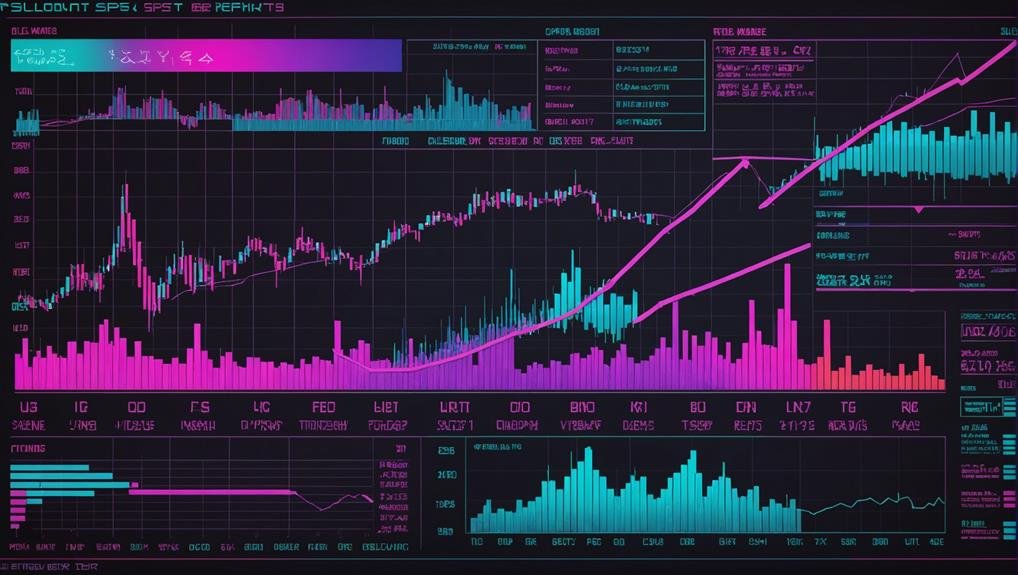Derivatives: Types, Considerations, and Pros and Cons
Derivatives encompass weather-based hedges, price lock products, and risk mitigation tools important for industries like agriculture. In considering derivatives, managing currency fluctuations effectively and hedging against adverse exchange rate movements are key functions. Differentiating futures, forwards, swaps, and options is essential for investors understanding financial markets. Settlements offer customization flexibility tailored to specific risk management strategies and financial goals. Derivatives provide leverage opportunities to manage market positions with reduced initial investments, while also posing significant risks including counterparty and leverage risks. Understanding the nuances of derivatives can enhance one's financial decision-making.
Key Takeaways
- Derivatives include futures, forwards, swaps, and options for various risk management strategies.
- Special considerations involve managing currency fluctuations and mitigating adverse exchange rate movements.
- Benefits of derivatives include risk management, leverage opportunities, and hedging against price fluctuations.
- Risks in derivatives markets include counterparty risk, leverage risks, and systemic risks.
- Settlements offer customization flexibility, aligning contracts with risk management strategies and financial objectives.
Categories of Derivatives
Derivatives encompass a variety of categories that serve distinct functions within the domain of financial markets. Weather-based derivatives are a unique subset that allow businesses to hedge against weather-related risks such as hurricanes or droughts impacting their operations. These derivatives can provide protection for industries like agriculture or energy that are heavily influenced by weather conditions.
On the other hand, lock products offer a way for investors to secure a specific price for an asset at a future date, thereby mitigating the risk of price fluctuations. Lock products can be beneficial for parties looking to lock in favorable prices or manage potential losses in volatile markets.
Both weather-based derivatives and lock products play essential roles in risk management strategies within the derivatives market.
Special Considerations in Derivatives
After exploring the various categories of derivatives that serve distinct functions within financial markets, it is important to examine specific aspects that play a significant role in the domain of derivatives, such as special considerations that offer unique insights into risk management strategies.
The origin of derivatives can be traced back to the need for balanced exchange rates, providing a mechanism to manage currency fluctuations effectively. One of the key functions of derivatives is risk management, allowing businesses to hedge against potential losses resulting from adverse movements in exchange rates.
Types of Derivatives
Within the domain of financial markets, a diverse array of instruments exists, each fulfilling distinct roles and characteristics, exemplified by the various categories encompassing weather-based derivatives, lock products, and option products. Derivatives pricing plays a critical role in determining the value of these instruments, which are subject to derivatives market dynamics. The table below illustrates the key types of derivatives and their primary features:
| Derivative Type | Description | Settlement Method |
|---|---|---|
| Futures | Purchase and delivery agreements, cash-settled | Physical or cash settlement |
| Forwards | Similar to futures, OTC trading, higher counterparty risk | Customizable settlement terms |
| Swaps | Exchange different cash flows like interest rates or currencies | OTC trading, variable settlement methods |
| Options | Provide right to buy or sell assets at predetermined prices | Can be exercised or expire worthless |
Understanding the distinctions between these derivatives is essential for investors navigating the complexities of financial markets.
Derivatives Settlements
Settlements in the domain of derivatives play an essential role in managing risk and ensuring the fulfillment of contractual obligations. Customization flexibility is a key feature in derivatives settlements, allowing parties to tailor agreements to their specific needs regarding terms, sizes, and settlement processes.
This customization enables participants to align the derivative contract more closely with their risk management strategies and financial objectives. Additionally, derivatives settlements have significant accounting implications, as they involve the recognition of cash flows and potential gains or losses.
Understanding these accounting implications is important for accurately reflecting the financial position and performance of entities engaging in derivative transactions. Therefore, participants in derivative markets must carefully consider both the customization flexibility and accounting implications when entering into derivative contracts.
Benefits and Risks of Derivatives
An analysis of derivatives reveals a spectrum of benefits and risks that impact financial strategies and market participants. Derivatives offer benefits such as risk management, enabling market players to hedge against adverse price movements and reduce exposure to financial uncertainties. Additionally, derivatives provide leverage opportunities, allowing investors to amplify their market positions with a smaller initial investment.
However, along with these advantages, derivatives pose risks that need careful consideration. Counterparty risk is a significant concern, as derivatives contracts are dependent on the financial stability of the parties involved. Leverage risks can also lead to substantial losses if market movements are unfavorable. Furthermore, the interconnected nature of derivatives markets can create systemic risks, where the failure of one entity impacts the entire market.
Conclusion
To sum up, derivatives offer a diverse array of opportunities for investors and businesses, but they also come with inherent risks. Understanding the categories, considerations, and settlements of derivatives is essential for navigating the financial markets.
While derivatives provide benefits such as hedging against risks and engaging in speculative activities, they also pose counterparty risks and leverage complexities. Delving deeper into the world of derivatives can help individuals make informed decisions in the dynamic world of finance.







